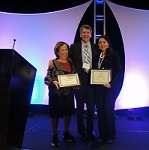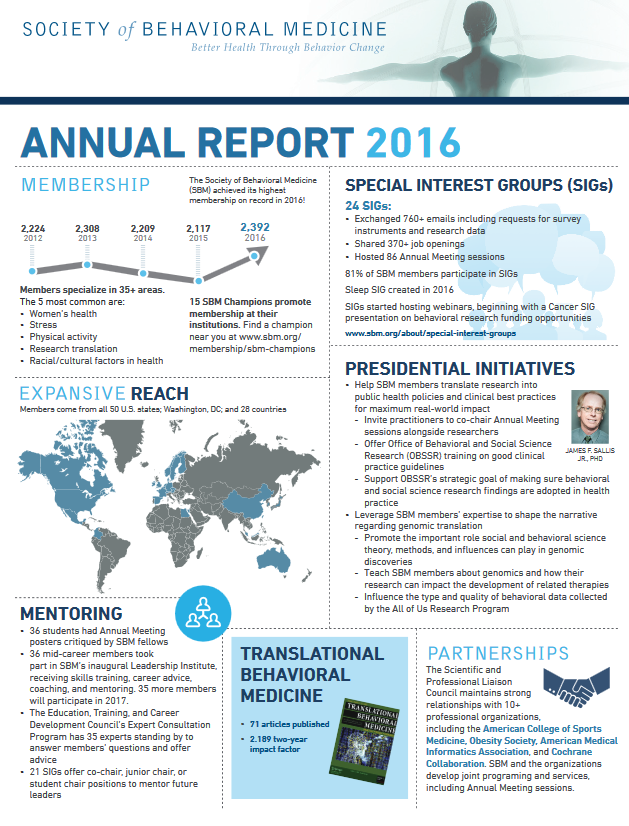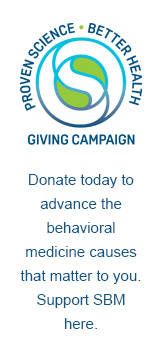
Summer 2017
President's Message: Extending Our Reach

When I hung my scientific poster at our Annual Meeting nearly two decades ago, I could never have imagined writing this message. To say that I'm honored and humbled to lead SBM are profound understatements. Like many of you, I owe a great debt to our Society; during my 20 years as a member, SBM has been a constant force in my life. At nearly all of my professional (and many personal) milestones, I can point to an SBM member or leader who has guided my steps. SBM is a special organization made up of highly committed, connected, and conscientious individuals who consistently impress me with their intellect and good cheer. Our community is small, but our size belies our import. By now, we can all recite the refrain: most of our country's most daunting health challenges have behavioral origins and we've shown that behavior change can prevent, manage, and cure most of these same conditions. Indeed, rarely in our country's history has there been greater need for what SBM members can uniquely provide -- evidence-based insights and solutions that can improve Americans' health.
2017 Annual Meeting Recap: La Buena Vista: Expanding Horizons in Behavioral Medicine
The Society of Behavioral Medicine's (SBM) 2017 Annual Meeting & Scientific Sessions kicked off with a thought-provoking opening keynote delivered by Robert K. Ross, MD, president and chief executive officer of The California endowment. Dr. Ross spoke about the 10 year Building Healthy Communities initiative to expand access to affordable, quality health care for underserved individuals and communities and to promote fundamental improvements in the health status of all Californians.
Congratulations to the Recipients of SBM's 2017 Achievement Awards

SBM extends a warm congratulations to the following recipients of the society’s 2017 achievement awards. Recipients formally received their awards from Dr. Sallis on March 30, 2017, during SBM’s 38th Annual Meeting & Scientific Sessions at the San Diego Hilton Bayfront in San Diego, CA.
Educational Innovations for Science Advocacy: A Call to Action
On Earth Day, many of us marched in the name of science. We did so in cities across the world. In a time when science is regularly dismissed by our government leaders, the excitement and public support of that march was inspiring. However, the March for Science did not halt the ongoing attacks on science. Obviously, this feels disheartening. However, like other times in life, when things get bad, there are opportunities for much needed growth. Now is the time to critically examine the status quo and identify ways to make positive changes.
Movin’ On Up: SBM Leadership Institute Participants See Gains at Work, in Research Dollars
Karen Mustian got $1 million in cancer research funding from her institution.
Lynette Craft got a promotion to chief science officer.
They accomplished these things through years of hard work—and some help from the Society of Behavioral Medicine’s (SBM’s) Leadership Institute.
2016 Annual Report Shows SBM's Year in One Infographic
What did SBM accomplish in 2016? It's all in the 2016 Annual Report infographic.
Recent Systematic Review Highlights the Need for Greater Transparency in Behavioral Medicine Clinical Trials
The EBBM SIG is dedicated to the creation of an evidence base in behavioral medicine, improving research methodology in the field, and translating evidence-based knowledge into evidence-based behavioral medicine practice. One vehicle for achieving these goals is the summary of existing literature into systematic reviews and meta-analyses, allowing for researchers and clinicians alike to efficiency consume the evidence available on a particular topic. The EBBM SIG is dedicated to training researchers in these skills as well as disseminating these highly impactful reviews as they become available. In this issue of SBM Outlook, we highlight a recent review from our very own EBBM SIG members.
How to Become a Good Leader – Advice from the “Meet the SBM Board of Directors†Session at SBM 2017

Welcome to the first “ETCD Council corner” segment. In each issue of Outlook, look to the ETCD Council corner for information related to our goals, which are to identify and promote interdisciplinary education and training efforts in behavioral medicine. The focus of this segment is on leadership. At the SBM 2017 Annual Meeting, the ETCD council facilitated round-table discussions between members of the SBM Board of Directors and about 50 SBM attendees at the Meet the SBM Board of Directors event. After completing their round-table discussions about leadership-related topics, each table shared some “pearls of wisdom” about how to become a good leader. Our ETCD council is using this forum to share these pearls with all of SBM. Many thanks to the SBM leaders and participants in our Meet the Board event for providing this shared wisdom.
Closing the Gap Between Research and Real-World Clinical Practices: Tips and Resources
Similar to other areas within behavioral medicine, there remains a gap between “research” and “clinical care” within integrated primary care. Current research is limited on essential elements that are relevant for real-world application, and/or criticized for being idealistic. The activation and engagement of clinicians in the research process can help to fill this gap. One way to integrate clinicians into the process is to examine real-world processes and clinical innovations, such as those developed and deemed efficacious. However, schemas of randomized clinical trials and insurmountable time may become activated when the word “research” is mentioned to non-researchers.
What Has the SBM Board Been up to?

As a newly-elected SBM Member Delegate, I would like to update the membership on recent Board activities and encourage members to seek out opportunities to get more involved in Society activities. I am guessing that many members may have little knowledge of what actually transpires at Board meetings, so I hope that this brief update will provide some sense of the exciting work that is going on among the SBM Leadership. As an example, the Board recently approved two new appointments of council chairs: Dr. Amy Huebschmann to the Education, Training, and Career Development Council and Dr. Amy Janke to the Scientific and Professional Liaison Council. In addition, Dr. Eric Heckler was approved to become the next incoming Annual Meeting Program Chair, to follow Rachel Shelton, who is the Program Chair for our next Annual Meeting, which will be held in New Orleans April 11-14, 2018. The 2018 Annual Meeting will feature the theme of "Extending Our Reach." Speakers will highlight the key connections that need to be built with a diverse range of sectors to maximize behavioral medicine’s reach and impact. This includes, but is not limited to policy-makers, government agencies, community organizations, journalists, healthcare practitioners, and industry partners.
The future of Orthopedic Care: Interview with Dr. David Ring, an Orthopedic Surgeon with a Knack for Psychological Care

The Pain Special Interest Group is pleased to introduce you to Dr. David Ring. He is the former Chief of Hand and Upper Extremity Service at Massachusetts General Hospital and Professor of Orthopedic Surgery at Harvard Medical School. He left this position 2 years ago to serve as Associate Dean of Comprehensive Care at Dell Medical School in Austin Texas. Dr. Ring is not your typical orthopedic surgeon – he has a strong interest in psychological factors associated with pain, and earned a PhD in Psychology from the University of Amsterdam. His research on psychosocial aspects of musculoskeletal illness encompasses original research publications on topics such as shared decision making, emotional functioning, coping strategies, and physician empathy. This interview provides a snippet of a model of a successful collaboration between a medical doctor and a psychologist. Such collaborations are key if we are to be successful with behavioral health integration efforts in both primary and specialty care clinics. The interview provides valuable information about challenges associated with behavioral health integration, as well as strategies to bypass these barriers.
Extending our Reach to Non-Academic Audiences: Lessons from the Military and Veterans Health Special Interest Group
In his persuasive presidential address, Jim Sallis encouraged SBM members to better communicate to the public, clinicians, organizations, and decision-makers, aligned with current SBM President Gary Bennett’s mission to “extend our reach”. To help the Military and Veterans Health Special Interest Group (MVH SIG) and SBM members put their calls into action, our incoming MVH SIG VA Co-Chair Katherine Hoerster shares strategies for activating the public on behavioral medicine issues, drawing on her recent publication of an op-ed, and past legislative advocacy.
Dr. Linda Gallo and Dr. Addie Fortmann on Addressing Diabetes within the Latino Community


Diabetes is a growing epidemic that heavily impacts the Latino population--- diabetes prevalence for Latinos was 17%, compared to 8% in non-Hispanic whites in the National Health and Nutrition Examination Survey. The Diabetes SIG spoke with Dr. Linda Gallo to learn how she studies the diabetes-related health needs of the Latino population in Hispanic Community Health Study/Study of Latinos (HCHS/SOL), and how she translates these findings into intervention research aiming to successfully promote diabetes self-management in this population. Dr. Linda Gallo is a Professor of Psychology and Co-Director South Bay Latino Research Center at San Diego State University. We also interviewed Dr. Addie Fortmann, PhD Research Scientist at the Scripps Whittier Diabetes Institute (SWDI), to learn how she collaborates with Dr. Gallo to create and implement diabetes management interventions for the Latino population.
SBM Poised to Address Rural Health Disparities at 2018 Annual Meeting
We often think of urban, medically-underserved populations as facing the most serious health disparities but increasing disparities are being seen in rural populations (Blake et al, 2017). This creates an opportunity for behavioral science researchers to apply our expertise to address these emerging health inequities. Approximately, 72% of the land area of the United States is rural as defined by Office of Management and Budget. Yet, only 15% of Americans live in rural locales across the U.S. This means that there are small communities that cannot sustain health providers and hospitals. Thus, rural residents face healthcare barriers distinct from urban poor populations. Healthcare challenges for rural populations include; limited geographic access to health providers, lack of adequately skilled hospitals for complicated illnesses, and fewer health education and health promotion programs. There is also limited technology such as broadband internet and telecommunications to coordinate care when rural patients do, in fact, access doctors and specialists. To further complicate this lack of access, rural populations are mostly older in age, have lower income, and face serious health issues such as lack of cancer screening and treatment.
Non-Academic Career Paths: An Interview with Dr. Kate Wolin

The Physical Activity Special Interest Group ( PA SIG) interviewed Kate Wolin, ScD about non-traditional career paths as a physical activity and obesity researcher. Dr. Wolin is a behavioral epidemiologist. Her academic research focused on the role of exercise and obesity in cancer risk reduction and survivorship. She is co-founder of two companies, Coeus Health and ScaleDown, and an Adjunct Associate Professor in the Department of Preventive Medicine at Northwestern University.
New Articles from Annals of Behavioral Medicine and Translational Behavioral Medicine
SBM's two journals, Annals of Behavioral Medicine and Translational Behavioral Medicine: Practice, Policy, Research (TBM), continuously publish online articles, many of which become available before issues are printed. The following articles were recently published online in Annals or TBM.
Honors and Awards
Congratulations to the following Society of Behavioral Medicine (SBM) members who recently received awards or were otherwise honored. To have your honor or award featured in the next issue of Outlook, please email ahahn@sbm.org.
Members in the News
The following Society of Behavioral Medicine (SBM) members and their research were recently featured in news articles or videos. To have your news spot featured in the next issue of Outlook, please email ahahn@sbm.org.
Classifieds
Visit the SBM Job Opportunities page for additional positions.
Editor's Note
Our Outlook is changing!

These are exciting times for SBM! It seems member engagement has never been higher and Americans need what our members have to offer more than ever. Our SBM organization appears to be expanding in multiple ways. One way expansion and increased engagement is showing itself is with Outlook!
Based on member feedback to a survey conducted last year, SBM’s Board has approved that Outlook expand from three issues per year to four! This will increase the opportunities some of the more active Councils and SIGs have to share their activities with the broader membership, and to encourage greater participation in SBM research and policy efforts. The current list of contributing SIGs and groups will still be expected to submit one article annually, however if there is activity of a group that merits the broader SBM membership should be notified, then we welcome ‘spontaneous’ submissions that will be accommodated on a first come, first serve basis (we do have limits!). Therefore starting immediately while the SBM office will alert groups when their annual article is due, do not feel limited to submitting articles only in your assigned quarter. We will be sending a call for article submissions for the fall issue in mid-July.
Another important expansion that will appear in the next issue of Outlook, based on SBM member requests, is a forum to ask questions of senior members and Board members. Many of you have asked for this as a way to get input on career advancement issues, alternative opportunities outside academia, and ‘pearls of wisdom’ from members successful in numerous ways. Please see this as a developing forum to get input on questions that may otherwise be difficult to ask. Thus my “ask” of you is to send me questions over the coming weeks that you would like to have an SBM Board member answer. Your question will be directed to someone in SBM leadership that may have the best experience to respond. Examples of questions may be
- How does one go about finding a mentor?
- How do I go about finding job opportunities outside academic medicine?
- What conferences other than SBM should I attend?
- How can I make the most of my time at the 2018 SBM Annual Meeting?
- What should I do if I am having difficulties with my primary mentor?
- How can I expand my mentoring network?
- In psychology graduate programs, what are the differences between clinical and research post-doctoral fellowships?
- How worried should I be about the federal funding climate?
Please send your questions to ahahn@sbm.org.
--William J. Sieber, PhD
Upcoming Events:
41st Annual Meeting & Scientific Sessions
April 1-4, 2020
San Francisco, CA

